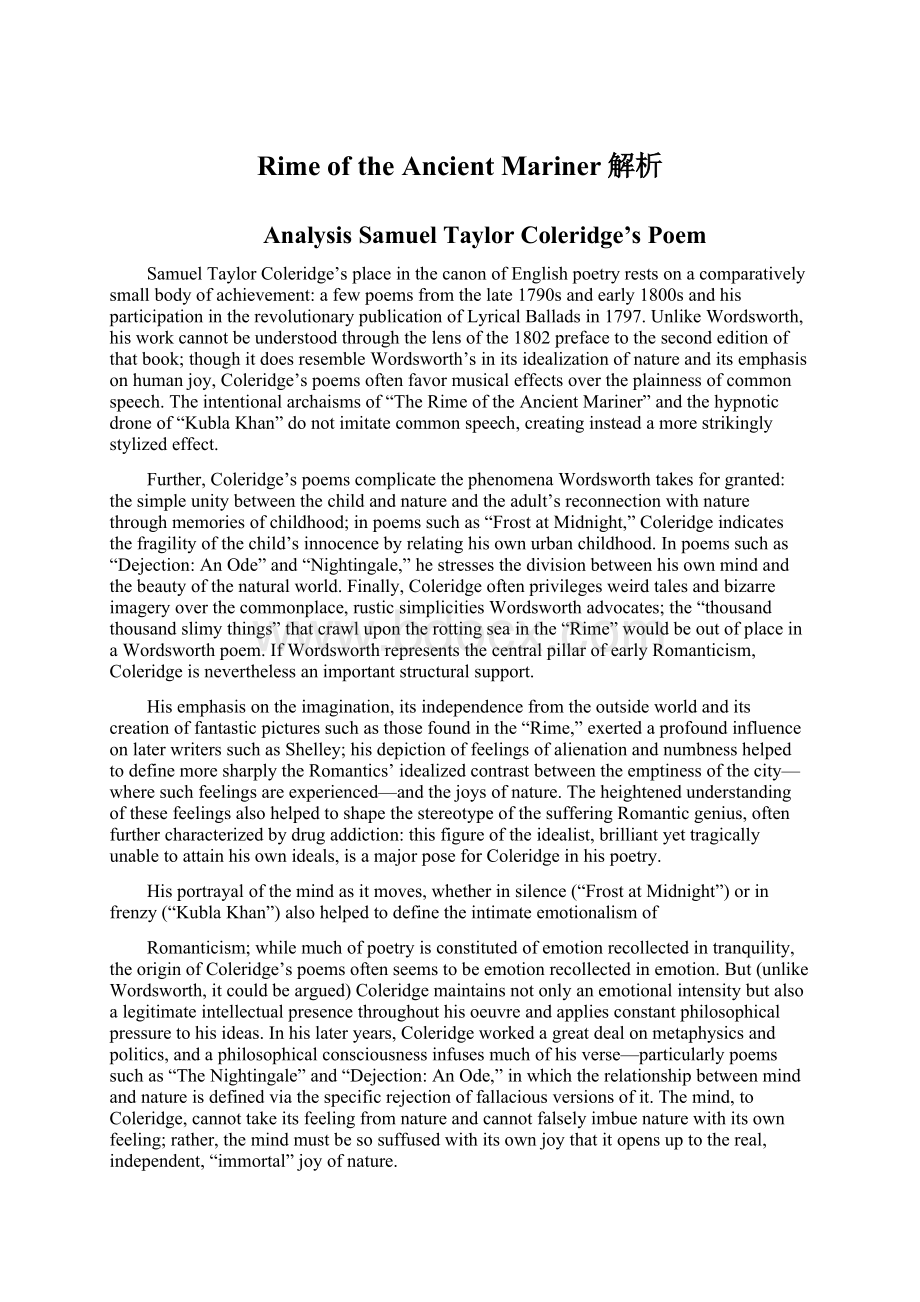Rime of the Ancient Mariner解析Word格式.docx
《Rime of the Ancient Mariner解析Word格式.docx》由会员分享,可在线阅读,更多相关《Rime of the Ancient Mariner解析Word格式.docx(9页珍藏版)》请在冰豆网上搜索。

afewpoemsfromthelate1790sandearly1800sandhisparticipationintherevolutionarypublicationofLyricalBalladsin1797.UnlikeWordsworth,hisworkcannotbeunderstoodthroughthelensofthe1802prefacetothesecondeditionofthatbook;
thoughitdoesresembleWordsworth’sinitsidealizationofnatureanditsemphasisonhumanjoy,Coleridge’spoemsoftenfavormusicaleffectsovertheplainnessofcommonspeech.Theintentionalarchaismsof“TheRimeoftheAncientMariner”andthehypnoticdroneof“KublaKhan”donotimitatecommonspeech,creatinginsteadamorestrikinglystylizedeffect.
Further,Coleridge’spoemscomplicatethephenomenaWordsworthtakesforgranted:
thesimpleunitybetweenthechildandnatureandtheadult’sreconnectionwithnaturethroughmemoriesofchildhood;
inpoemssuchas“FrostatMidnight,”Coleridgeindicatesthefragilityofthechild’sinnocencebyrelatinghisownurbanchildhood.Inpoemssuchas“Dejection:
AnOde”and“Nightingale,”hestressesthedivisionbetweenhisownmindandthebeautyofthenaturalworld.Finally,Coleridgeoftenprivilegesweirdtalesandbizarreimageryoverthecommonplace,rusticsimplicitiesWordsworthadvocates;
the“thousandthousandslimythings”thatcrawlupontherottingseainthe“Rime”wouldbeoutofplaceinaWordsworthpoem.IfWordsworthrepresentsthecentralpillarofearlyRomanticism,Coleridgeisneverthelessanimportantstructuralsupport.
Hisemphasisontheimagination,itsindependencefromtheoutsideworldanditscreationoffantasticpicturessuchasthosefoundinthe“Rime,”exertedaprofoundinfluenceonlaterwriterssuchasShelley;
hisdepictionoffeelingsofalienationandnumbnesshelpedtodefinemoresharplytheRomantics’idealizedcontrastbetweentheemptinessofthecity—wheresuchfeelingsareexperienced—andthejoysofnature.TheheightenedunderstandingofthesefeelingsalsohelpedtoshapethestereotypeofthesufferingRomanticgenius,oftenfurthercharacterizedbydrugaddiction:
thisfigureoftheidealist,brilliantyettragicallyunabletoattainhisownideals,isamajorposeforColeridgeinhispoetry.
Hisportrayalofthemindasitmoves,whetherinsilence(“FrostatMidnight”)orinfrenzy(“KublaKhan”)alsohelpedtodefinetheintimateemotionalismof
Romanticism;
whilemuchofpoetryisconstitutedofemotionrecollectedintranquility,theoriginofColeridge’spoemsoftenseemstobeemotionrecollectedinemotion.But(unlikeWordsworth,itcouldbeargued)Coleridgemaintainsnotonlyanemotionalintensitybutalsoalegitimateintellectualpresencethroughouthisoeuvreandappliesconstantphilosophicalpressuretohisideas.Inhislateryears,Coleridgeworkedagreatdealonmetaphysicsandpolitics,andaphilosophicalconsciousnessinfusesmuchofhisverse—particularlypoemssuchas“TheNightingale”and“Dejection:
AnOde,”inwhichtherelationshipbetweenmindandnatureisdefinedviathespecificrejectionoffallaciousversionsofit.Themind,toColeridge,cannottakeitsfeelingfromnatureandcannotfalselyimbuenaturewithitsownfeeling;
rather,themindmustbesosuffusedwithitsownjoythatitopensuptothereal,independent,“immortal”joyofnature.
Themes
TheTransformativePoweroftheImagination
Coleridgebelievedthatastrong,activeimaginationcouldbecomeavehiclefortranscendingunpleasantcircumstances.Manyofhispoemsarepoweredexclusivelybyimaginativeflights,whereinthespeakertemporarilyabandonshisimmediatesurroundings,exchangingthemforanentirelynewandcompletelyfabricatedexperience.Usingtheimaginationinthiswayisbothempoweringandsurprisingbecauseitencouragesatotalandcompletedisrespectfortheconfinesoftimeandplace.Thesementalandemotionaljumpsareoftenwellrewarded.Perhaps
Coleridge’smostfamoususeofimaginationoccursin“ThisLime-TreeBowerMyPrison”(1797),inwhichthespeakeremploysakeenpoeticmindthatallowshimtotakepartinajourneythathecannotphysicallymake.Whenhe“returns”tothebower,afterhavingimaginedhimselfonafantasticstrollthroughthecountryside,thespeakerdiscovers,asareward,plentyofthingstoenjoyfrominsidetheboweritself,includingtheleaves,thetrees,andtheshadows.Thepowerofimaginationtransformstheprisonintoaperfectlypleasantspot.
TheInterplayofPhilosophy,Piety,andPoetry
Coleridgeusedhispoetrytoexploreconflictingissuesinphilosophyandreligiouspiety.SomecriticsarguethatColeridge’sinterestinphilosophywassimplyhisattempttounderstandtheimaginativeandintellectualimpulsesthatfueledhispoetry.Tosupporttheclaimthathisimaginativeandintellectualforceswere,infact,organicandderivedfromthenaturalworld,ColeridgelinkedthemtoGod,spirituality,andworship.Inhiswork,however,poetry,philosophy,andpietyclashed,creatingfrictionanddisorderforColeridge,bothonandoffthepage.In“TheEolianHarp”(1795),Coleridgestrugglestoreconcilethethreeforces.Here,thespeaker’sphilosophicaltendencies,particularlythebeliefthatan“intellectualbreeze”(47)brushesbyandinhabitsalllivingthingswithconsciousness,collidewiththoseofhisorthodoxwife,whodisapprovesofhisunconventionalideasandurgeshimto
Christ.Whilehiswifeliesuntroubled,thespeakeragonizesoverhisspiritualconflict,caughtbetweenChristianityandaunique,individualspiritualitythatequatesnaturewithGod.Thepoemendsbydiscountingthepantheistspirit,andthespeakerconcludesbyprivilegingGodandChristovernatureandpraisingthemforhavinghealedhimfromthespiritualwoundsinflictedbytheseunorthodoxviews.
NatureandtheDevelopmentoftheIndividual
Coleridge,Wordsworth,andotherromanticpoetspraisedtheunencumbered,imaginativesoulofyouth,findingimagesinnaturewithwhichtodescribeit.Accordingtotheirformulation,experiencingnaturewasanintegralpartofthedevelopmentofacompletesoulandsenseofpersonhood.ThedeathofhisfatherforcedColeridgetoattendschoolinLondon,farawayfromtheruralidyllsofhisyouth,andhelamentedthemissedopportunitiesofhissheltered,city-boundadolescenceinmanypoems,including“FrostatMidnight”(1798).Here,thespeakersitsquietlybyafire,musingonhislife,whilehisinfantsonsleepsnearby.Herecallshisboardingschooldays,duringwhichhewouldbothdaydreamandlullhimselftosleepbyrememberinghishomefarawayfromthecity,andhetellshissonthatheshallneverberemovedfromnature,thewaythespeakeroncewas.Unlikethespeaker,thesonshallexperiencetheseasonsandshalllearnaboutGodbydiscoveringthebeautyandbountyofthenaturalworld.ThesonshallbegiventheopportunitytodeveloparelationshipwithGodandwithnature,anopportunitydeniedtoboththespeakerandColeridgehimself.ForColeridge,naturehadthecapacitytoteachjoy,love,freedom,andpiety,crucialcharacteristicsforaworthy,developedindividual.
Motifs
ConversationPoems
Coleridgewantedtomimicthepatternsandcadencesofeverydayspeechinhispoetry.Manyofhispoemsopenlyaddressasinglefigure—thespeaker’swife,son,friend,andsoon—wholistenssilentlytothesimple,straightforwardlanguageofthespeaker.Unlikethedescriptive,long,digressivepoemsofColeridge’sclassicistpredecessors,Coleridge’sso-calledconversationpoemsareshort,self-contained,andoftenwithoutadiscernablepoeticform.Colloquial,spontaneous,andfriendly,Coleridge’sconversationpoetryisalsohighlypersonal,frequentlyincorporatingeventsanddetailsofhisdomesticlifeinanefforttowidenthescopeofpossiblepoeticcontent.Althoughhesometimeswroteinblankverse,unrhymediambicpentameter,headaptedthismetricalformtosuitamorecolloquialrhythm.BothWordsworthandColeridgebelievedthateverydaylanguageandspeechrhythmswouldhelpbroadenpoetry’saudiencetoincludethemiddleandlowerclasses,whomighthavefeltexcludedorputoffbytheformandcontentofneoclassicists,suchasAlexanderPope,LadyMaryWortleyMontagu,andJohnDryden.
DelightintheNaturalWorld
Liketheotherromantics,Coleridgeworshipednatureandrecognizedpoetry’scapacitytodescribethebeautyofthenaturalworld.NearlyallofColeridge’spoemsexpressarespectforanddelightinnaturalbeauty.Closeobservation,greatattentiontodetail,andprecisedescriptionsofcoloraptlydemonstrateColeridge’srespectanddelight.Somepoems,suchas“ThisLime-TreeBowerMyPrison,”“YouthandAge”(1834),and“FrostatMidnight,”mournthespeakers’physicalisolationfromtheoutsideworld.Others,including“TheEolianHarp,”useimagesofnaturetoexplorephilosophicalandanalyticalideas.Stillotherpoems,including“TheNightingale”(ca.1798),simplypraisenature’sbeauty.
Evenpoemsthatdon’tdirectlydealwithnature,including“KublaKhan”and“TheRimeoftheAncientMariner,”derivesomesymbolsandimagesfromnature.Nevertheless,Coleridgeguardedagainstthepatheticfallacy,ortheattributionofhumanfeelingtothenaturalworld.ToColeridge,naturecontainedaninnate,constantjoyousnesswhollyseparatefromtheupsanddownsofhumanexperience.
Prayer
AlthoughColeridge’sproserevealsmoreofhisreligiousphilosophizingthanhispoetry,God,Christianity,andtheactofprayerappearinsomeforminnearlyallofhispoems.ThesonofanAnglicanvicar,ColeridgevacillatedfromsupportingtocriticizingChristiantenetsandtheChurchofEngland.Despit